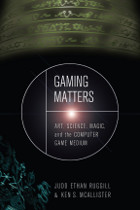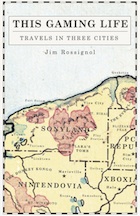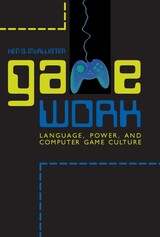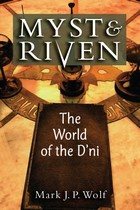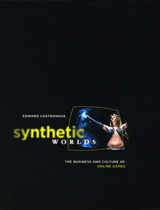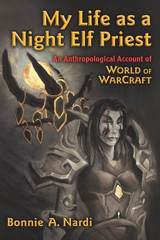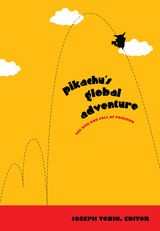Video Game StudiesCollection by Chris Havlin (8 items)Don't play around with your video game education. Includes the following tags:
Business, Communications, Computer games, Fall, Games & Activities, Internet games, Korea (South), Marketing, McAllister, Ken S., Media Studies, My Life, Ruggill, Judd Ethan, Synthetic Worlds, Three Cities, Tobin, Joseph, Travels, Video & Mobile, Video games, Video games industry, Virtual & Augmented Reality, Visual anthropology, Wolf, Mark J. P., World
See More
|
Gaming Matters
by Judd Ethan Ruggill and Ken S. McAllister
University of Alabama Press, 2011
In his 2004 book Game Work, Ken S. McAllister proposed a rigorous critical methodology for the discussion of the “video game complex”—the games themselves, their players, the industry that produces them, and those who review and market them. Games, McAllister demonstrated, are viewed and discussed very differently by different factions: as an economic force, as narrative texts, as a facet of popular culture, as a psychological playground, as an ethical and moral force, even as a tool for military training.
In Gaming Matters, McAllister and coauthor Judd Ruggill turn from the broader discussion of video game rhetoric to study the video game itself as a medium and the specific features that give rise to games as similar and yet diverse as Pong, Tomb Raider, and Halo. In short, what defines the computer game itself as a medium distinct from all others? Each chapter takes up a different fundamental characteristic of the medium. Games are:
• Idiosyncratic, and thus difficult to apprehend using the traditional tools of media study
• Irreconcilable, or complex to such a degree that developers, players, and scholars have contradictory ways of describing them
• Boring, and therefore obligated to constantly make demands
on players’ attention
• Anachronistic, or built on age-old tropes and forms of play
while ironically bound to the most advanced technologies
• Duplicitous, or dependent on truth-telling rhetoric even when they are about fictions, fantasies, or lies
• Work, or are often better understood as labor rather than play
• Alchemical, despite seeming all-too mechanical or predictable
Video games are now inarguably a major site of worldwide cultural production.
Gaming Matters will neither flatter game enthusiasts nor embolden game detractors in their assessments. But it will provide a vocabulary through which games can be discussed in academic settings and will create an important foundation for future academic discourse.
2
|
This Gaming Life
by Jim Rossignol
University of Michigan Press, 2009
"In May 2000 I was fired from my job as a reporter on a finance newsletter because of an obsession with a video game. It was the best thing that ever happened to me.” So begins this story of personal redemption through the unlikely medium of electronic games. Quake, World of Warcraft, Eve Online, and other online games not only offered author Jim Rossignol an excellent escape from the tedium of office life. They also provided him with a diverse global community and a job—as a games journalist. Part personal history, part travel narrative, part philosophical reflection on the meaning of play, This Gaming Life describes Rossignol’s encounters in three cities: London, Seoul, and Reykjavik. From his days as a Quake genius in London’s increasingly corporate gaming culture; to Korea, where gaming is a high-stakes televised national sport; to Iceland, the home of his ultimate obsession, the idiosyncratic and beguiling Eve Online, Rossignol introduces us to a vivid and largely undocumented world of gaming lives. Torn between unabashed optimism about the future of games and lingering doubts about whether they are just a waste of time, This Gaming Life also raises important questions about this new and vital cultural form. Should we celebrate the “serious” educational, social, and cultural value of games, as academics and journalists are beginning to do? Or do these high-minded justifications simply perpetuate the stereotype of games as a lesser form of fun? In this beautifully written, richly detailed, and inspiring book, Rossignol brings these abstract questions to life, immersing us in a vibrant landscape of gaming experiences. “We need more writers like Jim Rossignol, writers who are intimately familiar with gaming, conversant in the latest research surrounding games, and able to write cogently and interestingly about the experience of playing as well as the deeper significance of games.” “This Gaming Life is a fascinating and eye-opening look into the real human impact of gaming culture. Traveling the globe and drawing anecdotes from many walks of life, Rossignol takes us beyond the media hype and into the lives of real people whose lives have been changed by gaming. The results may surprise you.” —Joshua Davis, author of The Underdog “This is a wonderfully literate look at gaming cultures, which you don't have to be a gamer to enjoy. The Korea section blew my mind.” digitalculturebooks is an imprint of the University of Michigan Press and the Scholarly Publishing Office of the University of Michigan Library dedicated to publishing innovative and accessible work exploring new media and their impact on society, culture, and scholarly communication. Visit the website at www.digitalculture.org.
3
|
Game Work
by Ken S. McAllister
University of Alabama Press, 2006
Video and computer games in their cultural contexts. As the popularity of computer games has exploded over the past decade, both scholars and game industry professionals have recognized the necessity of treating games less as frivolous entertainment and more as artifacts of culture worthy of political, social, economic, rhetorical, and aesthetic analysis. Ken McAllister notes in his introduction to Game Work that, even though games are essentially impractical, they are nevertheless important mediating agents for the broad exercise of socio-political power. In considering how the languages, images, gestures, and sounds of video games influence those who play them, McAllister highlights the ways in which ideology is coded into games. Computer games, he argues, have transformative effects on the consciousness of players, like poetry, fiction, journalism, and film, but the implications of these transformations are not always clear. Games can work to maintain the status quo or celebrate liberation or tolerate enslavement, and they can conjure feelings of hope or despair, assent or dissent, clarity or confusion. Overall, by making and managing meanings, computer games—and the work they involve and the industry they spring from—are also negotiating power. This book sets out a method for "recollecting" some of the diverse and copious influences on computer games and the industry they have spawned. Specifically written for use in computer game theory classes, advanced media studies, and communications courses, Game Work will also be welcome by computer gamers and designers. Ken S. McAllister is Assistant Professor of Rhetoric, Composition, and the Teaching of English at the University of Arizona and Co-Director of the Learning Games Initiative, a research collective that studies, teaches with, and builds computer games.
4
|
Myst and Riven
by Mark J. P. Wolf
University of Michigan Press, 2011
“Myst and Riven is well-written, interesting, on-topic, insightful, and a real pleasure to read.” Video games have become a major cultural force, and within their history, Myst and its sequel Riven stand out as influential examples. Myst and Riven: The World of the D’ni is a close analysis of two of the most popular and significant video games in the history of the genre, investigating in detail their design, their functionality, and the gameplay experience they provide players. While scholarly close analysis has been applied to films for some time now, it has only rarely been applied at this level to video games. Mark J. P. Wolf uses elements such as graphics and sound, the games’ mood and atmosphere and how they are generated, the geography and design of the digital worlds, and the narrative structures of the games to examine their appeal to both critical and general audiences, their legacy, and what made them great. Myst and Riven is the inaugural book in the Landmark Video Games series, edited by Mark J. P. Wolf and Bernard Perron, which is the first series to examine individual video games of historical significance.
5
|
Synthetic Worlds
by Edward Castronova
University of Chicago Press, 2006
From EverQuest to World of Warcraft, online games have evolved from the exclusive domain of computer geeks into an extraordinarily lucrative staple of the entertainment industry. People of all ages and from all walks of life now spend thousands of hours—and dollars—partaking in this popular new brand of escapism. But the line between fantasy and reality is starting to blur. Players have created virtual societies with governments and economies of their own whose currencies now trade against the dollar on eBay at rates higher than the yen. And the players who inhabit these synthetic worlds are starting to spend more time online than at their day jobs. In Synthetic Worlds, Edward Castronova offers the first comprehensive look at the online game industry, exploring its implications for business and culture alike. He starts with the players, giving us a revealing look into the everyday lives of the gamers—outlining what they do in their synthetic worlds and why. He then describes the economies inside these worlds to show how they might dramatically affect real world financial systems, from potential disruptions of markets to new business horizons. Ultimately, he explores the long-term social consequences of online games: If players can inhabit worlds that are more alluring and gratifying than reality, then how can the real world ever compete? Will a day ever come when we spend more time in these synthetic worlds than in our own? Or even more startling, will a day ever come when such questions no longer sound alarmist but instead seem obsolete? With more than ten million active players worldwide—and with Microsoft and Sony pouring hundreds of millions of dollars into video game development—online games have become too big to ignore. Synthetic Worlds spearheads our efforts to come to terms with this virtual reality and its concrete effects. “Illuminating. . . . Castronova’s analysis of the economics of fun is intriguing. Virtual-world economies are designed to make the resulting game interesting and enjoyable for their inhabitants. Many games follow a rags-to-riches storyline, for example. But how can all the players end up in the top 10%? Simple: the upwardly mobile human players need only be a subset of the world's population. An underclass of computer-controlled 'bot' citizens, meanwhile, stays poor forever. Mr. Castronova explains all this with clarity, wit, and a merciful lack of academic jargon.”—The Economist
“Synthetic Worlds is a surprisingly profound book about the social, political, and economic issues arising from the emergence of vast multiplayer games on the Internet. What Castronova has realized is that these games, where players contribute considerable labor in exchange for things they value, are not merely like real economies, they are real economies, displaying inflation, fraud, Chinese sweatshops, and some surprising in-game innovations.”—Tim Harford, Chronicle of Higher Education
6
|
My Life as a Night Elf Priest
by Bonnie Nardi
University of Michigan Press, 2010
"Ever since the creators of the animated television show South Park turned their lovingly sardonic gaze on the massively multiplayer online game World of Warcraft for an entire episode, WoW's status as an icon of digital culture has been secure. My Life as a Night Elf Priest digs deep beneath the surface of that icon to explore the rich particulars of the World of Warcraft player's experience." "World of Warcraft is the best representative of a significant new technology, art form, and sector of society: the theme-oriented virtual world. Bonnie Nardi's pioneering transnational ethnography explores this game both sensitively and systematically using the methods of cultural anthropology and aesthetics with intensive personal experience as a guild member, media teacher, and magical quest Elf." —William Sims Bainbridge, author of The Warcraft Civilization and editor of Online Worlds
“Nardi skillfully covers all of the hot button issues that come to mind when people think of video games like World of Warcraft such as game addiction, sexism, and violence. What gives this book its value are its unexpected gems of rare and beautifully detailed research on less sensationalized topics of interest such as the World of Warcraft player community in China, game modding, the increasingly blurred line between play and work, and the rich and fascinating lives of players and player cultures. Nardi brings World of Warcraft down to earth for non-players and ties it to social and cultural theory for scholars. . . . the best ethnography of a single virtual world produced so far.”
—Lisa Nakamura, University of Illinois World of Warcraft rapidly became one of the most popular online world games on the planet, amassing 11.5 million subscribers—officially making it an online community of gamers that had more inhabitants than the state of Ohio and was almost twice as populous as Scotland. It's a massively multiplayer online game, or MMO in gamer jargon, where each person controls a single character inside a virtual world, interacting with other people's characters and computer-controlled monsters, quest-givers, and merchants. In My Life as a Night Elf Priest, Bonnie Nardi, a well-known ethnographer who has published extensively on how theories of what we do intersect with how we adopt and use technology, compiles more than three years of participatory research in Warcraft play and culture in the United States and China into this field study of player behavior and activity. She introduces us to her research strategy and the history, structure, and culture of Warcraft; argues for applying activity theory and theories of aesthetic experience to the study of gaming and play; and educates us on issues of gender, culture, and addiction as part of the play experience. Nardi paints a compelling portrait of what drives online gamers both in this country and in China, where she spent a month studying players in Internet cafes. Bonnie Nardi has given us a fresh look not only at World of Warcraft but at the field of game studies as a whole. One of the first in-depth studies of a game that has become an icon of digital culture, My Life as a Night Elf Priest will capture the interest of both the gamer and the ethnographer. Bonnie A. Nardi is an anthropologist by training and a professor in the Department of Informatics in the Donald Bren School of Information and Computer Sciences at the University of California, Irvine. Her research focus is the social implications of digital technologies. She is the author of A Small Matter of Programming: Perspectives on End User Computing and the coauthor of Information Ecologies: Using Technology with Heart and Acting with Technology: Activity Theory and Interaction Design. Cover art by Jessica Damsky
7
|
Pikachu's Global Adventure
edited by Joseph Tobin
contributions by David Buckingham, Julian Sefton-Green, Anne Allison and Koichi Iwabuchi Duke University Press, 2004
Initially developed in Japan by Nintendo as a computer game, Pokémon swept the globe in the late 1990s. Based on a narrative in which a group of children capture, train, and do battle with over a hundred imaginary creatures, Pokémon quickly diversified into an array of popular products including comic books, a TV show, movies, trading cards, stickers, toys, and clothing. Pokémon eventually became the top grossing children's product of all time. Yet the phenomenon fizzled as quickly as it had ignited. By 2002, the Pokémon craze was mostly over. Pikachu’s Global Adventure describes the spectacular, complex, and unpredictable rise and fall of Pokémon in countries around the world. In analyzing the popularity of Pokémon, this innovative volume addresses core debates about the globalization of popular culture and about children’s consumption of mass-produced culture. Topics explored include the origins of Pokémon in Japan’s valorization of cuteness and traditions of insect collecting and anime; the efforts of Japanese producers and American marketers to localize it for foreign markets by muting its sex, violence, moral ambiguity, and general feeling of Japaneseness; debates about children’s vulnerability versus agency as consumers; and the contentious question of Pokémon’s educational value and place in school. The contributors include teachers as well as scholars from the fields of anthropology, media studies, sociology, and education. Tracking the reception of Pokémon in Japan, the United States, Great Britain, France, and Israel, they emphasize its significance as the first Japanese cultural product to enjoy substantial worldwide success and challenge western dominance in the global production and circulation of cultural goods. Contributors. Anne Allison, Linda-Renée Bloch, Helen Bromley, Gilles Brougere, David Buckingham, Koichi Iwabuchi, Hirofumi Katsuno, Dafna Lemish, Jeffrey Maret, Julian Sefton-Green, Joseph Tobin, Samuel Tobin, Rebekah Willet, Christine Yano
8
|
|
| Click here to go to the beginning. | ||||||||

